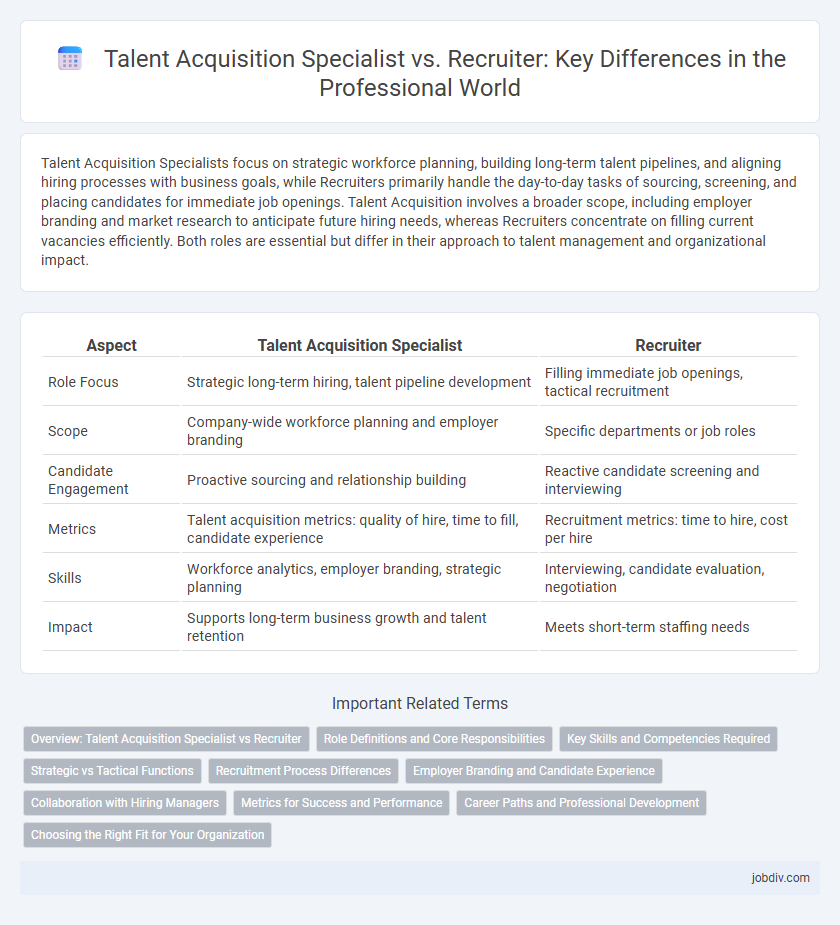Talent Acquisition Specialists focus on strategic workforce planning, building long-term talent pipelines, and aligning hiring processes with business goals, while Recruiters primarily handle the day-to-day tasks of sourcing, screening, and placing candidates for immediate job openings. Talent Acquisition involves a broader scope, including employer branding and market research to anticipate future hiring needs, whereas Recruiters concentrate on filling current vacancies efficiently. Both roles are essential but differ in their approach to talent management and organizational impact.
Table of Comparison
| Aspect | Talent Acquisition Specialist | Recruiter |
|---|---|---|
| Role Focus | Strategic long-term hiring, talent pipeline development | Filling immediate job openings, tactical recruitment |
| Scope | Company-wide workforce planning and employer branding | Specific departments or job roles |
| Candidate Engagement | Proactive sourcing and relationship building | Reactive candidate screening and interviewing |
| Metrics | Talent acquisition metrics: quality of hire, time to fill, candidate experience | Recruitment metrics: time to hire, cost per hire |
| Skills | Workforce analytics, employer branding, strategic planning | Interviewing, candidate evaluation, negotiation |
| Impact | Supports long-term business growth and talent retention | Meets short-term staffing needs |
Overview: Talent Acquisition Specialist vs Recruiter
Talent Acquisition Specialists focus on long-term workforce planning, employer branding, and strategic sourcing to attract top talent aligned with company goals. Recruiters concentrate on filling immediate job vacancies by screening candidates, coordinating interviews, and managing the hiring process efficiently. While both roles aim to secure skilled professionals, Talent Acquisition Specialists prioritize building talent pipelines, whereas Recruiters emphasize rapid placement.
Role Definitions and Core Responsibilities
A Talent Acquisition Specialist focuses on strategic workforce planning, creating employer branding initiatives, and developing long-term recruitment strategies to attract top talent aligned with business goals. In contrast, a Recruiter primarily manages end-to-end hiring processes by sourcing, screening, and interviewing candidates to fulfill immediate job openings. Both roles require strong candidate evaluation skills, but Talent Acquisition Specialists emphasize proactive talent pipelining and market analysis, while Recruiters concentrate on efficient candidate selection and placement.
Key Skills and Competencies Required
Talent Acquisition Specialists require strategic sourcing abilities, workforce planning expertise, and strong relationship management skills to align talent strategies with organizational goals. Recruiters focus on candidate screening, interview coordination, and effective communication to fill vacancies efficiently. Both roles demand proficiency in applicant tracking systems (ATS), talent market analysis, and negotiation skills to secure top talent.
Strategic vs Tactical Functions
Talent Acquisition Specialists focus on strategic functions such as workforce planning, employer branding, and long-term talent pipeline development to align hiring with organizational goals. Recruiters primarily execute tactical functions by managing job postings, screening candidates, and coordinating interviews to fill immediate vacancies efficiently. This distinction highlights the Talent Acquisition Specialist's role in shaping future talent strategies, while Recruiters address current hiring needs.
Recruitment Process Differences
Talent Acquisition Specialists focus on strategic long-term workforce planning, utilizing data analytics and employer branding to attract high-quality candidates, whereas Recruiters primarily manage the immediate hiring process by sourcing, screening, and coordinating interviews. Talent Acquisition involves building talent pipelines and aligning recruitment with organizational goals, while Recruiters handle day-to-day job requisitions and candidate transactions. The differentiation in recruitment processes reflects Talent Acquisition's emphasis on proactive talent management versus Recruiter's operational role in filling current vacancies.
Employer Branding and Candidate Experience
Talent Acquisition Specialists focus on strategic employer branding to attract top talent and enhance the overall candidate experience throughout the hiring process. Recruiters primarily handle candidate sourcing and screening but may have limited involvement in reinforcing the employer brand. Emphasizing employer branding and candidate experience differentiates Talent Acquisition Specialists by aligning recruitment efforts with long-term organizational goals.
Collaboration with Hiring Managers
Talent Acquisition Specialists collaborate closely with hiring managers to develop strategic workforce plans, ensuring alignment with long-term organizational goals. They facilitate detailed hiring needs assessments and provide insights into market trends that influence talent sourcing. Recruiters focus on executing the hiring process by working directly with hiring managers to screen candidates, coordinate interviews, and manage communication throughout the recruitment cycle.
Metrics for Success and Performance
Talent Acquisition Specialists measure success through metrics such as quality of hire, time to fill, and candidate experience scores, emphasizing strategic alignment with long-term organizational goals. Recruiters focus on volume-based performance indicators like number of placements, response rate, and time to contact, prioritizing immediate hiring needs. Both roles leverage applicant tracking system (ATS) analytics and hiring manager feedback to enhance recruitment efficiency and accuracy.
Career Paths and Professional Development
Talent Acquisition Specialists often pursue strategic roles involving workforce planning and employer branding, while Recruiters typically focus on sourcing and filling vacancies. Career advancement for Talent Acquisition Specialists may lead to Talent Acquisition Manager or HR Business Partner positions, emphasizing broader organizational impact. Professional development for Recruiters centers on honing candidate assessment techniques and industry-specific knowledge to enhance placement success rates.
Choosing the Right Fit for Your Organization
Talent Acquisition Specialists focus on strategic workforce planning, employer branding, and long-term talent pipelines, making them ideal for organizations aiming to develop a sustainable hiring framework. Recruiters concentrate on filling immediate job openings quickly and efficiently, which suits companies with urgent staffing needs. Choosing the right fit depends on whether your organization prioritizes comprehensive talent strategies or rapid candidate placement.
Talent Acquisition Specialist vs Recruiter Infographic

 jobdiv.com
jobdiv.com